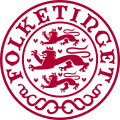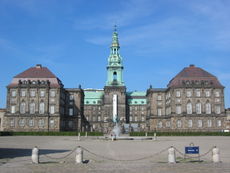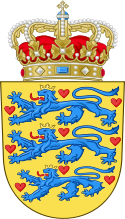Folketing
| Folketing | |
|---|---|
 |
|
| Type | |
| Type | Unicameral |
| Leadership | |
| Speaker | Thor Pedersen, Venstre since 28 November 2007 |
| Structure | |
| Members | 179 |
| Political groups | Venstre (47) Social Democrats (45) Danish People's Party (24) Socialist People's Party (23) Conservative People's Party (16) Social Liberal Party (9) Red-Green Alliance (4) Liberal Alliance (3) Christian Democrats (1) Siumut (1) Inuit Ataqatigiit (1) Republican Party (1) Union Party (1) Independent (2) |
| Election | |
| Last election | 13 November 2007 |
| Meeting place | |
 |
|
| Christiansborg Palace, Copenhagen | |
| Website | |
| www.ft.dk | |
The Folketing (Danish Folketinget Danish pronunciation: [ˈfɔlɡəˌtʰeŋˤ]), is the national parliament of Denmark. The name literally means “People's Thing”—that is, the people's governing assembly.
Contents |
History
From 1849 to 1953 the Folketing was one of the two houses in the bicameral parliament known as the Rigsdag; the other house was known as the Landsting. Since both houses, in principle, had equal power, the terms "upper house" and "lower house" were not used. The difference between the houses was voter representation.
The Folketing was elected by common vote and consisted mainly of independent farmers, traders and merchants as well as the educated classes (i.e. the liberal forces of society). From 1866 to 1915 the right of vote for the Landsting was restricted to the wealthiest, and some of its members were even appointed by the king, thus it predominantly represented the old aristocracy and other conservatives. From 1915 the Landsting was also elected by common vote, although indirectly and with a higher age limit than for the Folketing. During the next decades, law making mainly took place in the Folketing and the Landsting came to be regarded as a superfluous rubber stamp.
In 1953 the people by popular vote adopted a revised constitution. Among the changes was the elimination of the Landsting and the introduction of a unicameral parliament, known only as the Folketing. Christiansborg Palace has been the domicile of parliament since 1849. The palace is located in the heart of Copenhagen.
Last election results
| Parties | Leaders | Votes | % | Seats | +/ – | |
|---|---|---|---|---|---|---|
| Denmark | ||||||
| Liberals (Venstre) (V) | Anders Fogh Rasmussen | 908,472 | 26.2% | 46 | –6 | |
| Social Democrats (Socialdemokraterne) (A) | Helle Thorning-Schmidt | 881,037 | 25.5% | 45 | –2 | |
| Danish People's Party (Dansk Folkeparti) (O) | Pia Kjærsgaard | 479,532 | 13.9% | 25 | +1 | |
| Socialist People's Party (Socialistisk Folkeparti) (F) | Villy Søvndal | 450,975 | 13.0% | 23 | +12 | |
| Conservative People's Party (Det Konservative Folkeparti) (C) | Bendt Bendtsen | 359,404 | 10.4% | 18 | ±0 | |
| Social Liberal Party (Det Radikale Venstre) (B) | Margrethe Vestager | 177,161 | 5.1% | 9 | –8 | |
| New Alliance (Ny Alliance) (Y) | Naser Khader | 97,295 | 2.8% | 5 | +5 | |
| Red-Green Alliance (Enhedslisten) (Ø) | Collective leadership | 74,982 | 2.2% | 4 | –2 | |
| Christian Democrats (Kristendemokraterne) (K) | Bodil Kornbek | 30,013 | 0.9% | 0 | ±0 | |
| Candidates without parties | 549 | 0.0% | 0 | ±0 | ||
| Subtotal | 3,459,420 | 100.0% | 175 | — | ||
| Faroe Islands | ||||||
| Republican Party (Tjóðveldi) (E) | Høgni Hoydal | 5,949 | 25.4 | 1 | ±0.0 % | |
| Union Party (Sambandsflokkurin) (B) | Kaj Leo Johannesen | 5,413 | 23.5 | 1 | +2.1 % | |
| People's Party (Fólkaflokkurin) (A) | Jørgen Niclasen | 4,726 | 20.5 | 0 | -3.6 % | |
| Social Democratic Party (Javnaðarflokkurin) (C) | Jóannes Eidesgaard | 4,702 | 20.4 | 0 | -1.8 % | |
| Centre Party (Miðflokkurin) (H) | Álvur Kirke | 1,577 | 6.8 | 0 | +3.5 % | |
| Self-Government Party (Sjálvstýrisflokkurin) (D) | Kári P. Højgaard | 797 | 3.5 | 0 | +1.1 % | |
| Subtotal | 23,164 | 100% | 2 | |||
| Greenland | ||||||
| Inuit Community (Inuit Ataqatigiit) | Josef Motzfeldt | 7,107 | 33.5 | 1 | ||
| Forward (Siumut) | Hans Enoksen | 6,658 | 31.4 | 1 | ||
| Feeling of Community (Atassut) | Finn Karlsen | 4,004 | 18.9 | 0 | ||
| Democrats (Demokraatit) | Per Berthelsen | 3,436 | 16.2 | 0 | ||
| Subtotal | 21,205 | 100% | 2 | |||
| Total (Turnout: 86.6 %) | 179 Seats | |||||
Subsequent changes
Following the election a number of members have switched parties.
Liberal Alliance
New Alliance changed its name to Liberal Alliance and underwent a lot of changes in its parliamentary group:
- Simon Emil Ammitzbøll left the Social Liberal Party and represented the newly formed Borgerligt Centrum for a short while until he left that (as well), and joined Liberal Alliance.
- Malou Aamund left New Alliance and joined Venstre.
- Jørgen Poulsen was excluded from New Alliance in June 2008 and joined the Social Liberal Party.
- Gitte Seeberg left her New Alliance seat in parliament in favour of becoming the secretary general of WWF Denmark; her substitute is Villum Christensen.
- Naser Khader left New Alliance following a leadership dispute; the party then changed its name to Liberal Alliance and is led by Anders Samuelsen; Khader was an independent at first but then joined the Conservatives.
| Denmark |
 This article is part of the series: |
|
|
See also
|
|
Other countries · Atlas |
The Conservatives
- Pia Christmas-Møller has left the Conservatives and is now an independent member.
- Per Ørum Jørgensen has left the Conservatives and now represents the Christian Democrats.
Constitutional requirements
- The Folketing consists of 179 members all elected for a four-year term or until the Prime Minister (via the Queen-in-council) calls for elections, whichever comes first. Greenland and the Faroe Islands each elect 2 members separately.
- The Constitution requires for "equal representation of the various opinions of the electorate", and for regional representation to be secured. The electoral act stipulates the details for this: 135 seats are elected by proportional representation in 17 districts, and 40 supplementary seats are allotted to make out for the difference between district and nation-wide vote. The 135 seats are distributed to the parties by the D'Hondt method of the party-list system of proportional representation and the 40 supplementary seats by the Sainte-Laguë method. Each party may choose among a number of methods for how the seats won by that party are to be distributed among the candidates.[1]
- The result is proportional representation; however, in rare cases, the biggest parties may gain one or two seats extra from smaller parties.
- The voter may vote for a party list, one of the candidates on a party list, or an independent candidate.
- Parties (usually district party assemblies) decide on the nomination of candidates before the election. When co-nomination is assigned, candidates are elected according to personal votes. When priority order is assigned, only an extreme number of personal votes can change the rank.
- Parties must either pass the threshold, 2% of the national vote, or gain a district seat to gain any supplemental seats. Though possible, it is very rare for a party to gain a district seat without getting 2% of the national vote.
- To contest an election, parties which are not currently represented in Parliament must collect certificates of support from ca. 20,000 voters (the number of valid votes cast in Denmark proper at the previous election divided by 175, the equivalent of one seat) and have these individually stamped by the registration offices in these voters' municipalities of residence.
- Denmark has universal suffrage for all citizens over 18 years who live in the realm and who have not been declared incapable of managing their own affairs. The constitution makes it possible to restrict suffrage for convicted criminals and people receiving social benefits, but this option has not been used for several decades.
- All voters who have not been convicted of criminal acts, making them unworthy for a seat in the parliament, are eligible. The Folketing decides if a member is eligible or not (after his election).
- The constitution does not mention political parties at all, although the electoral act does, and MPs are virtually always elected for a party. The only independent who has been elected in modern times is the comedian Jacob Haugaard, but independents, usually unknown ones, are seen at every election. Requirements for standing as an independent candidate are much smaller than for a new party, but independents are only allowed to contest in a single district, making it very difficult to gain the needed number of votes for a seat.
- Members enjoy immunity, meaning that no criminal charges may be brought against an MP, unless he is caught red-handed, provided that the Folketing doesn't lift the immunity. The purpose of this is to prevent political persecution. In practice, the Folketing has always lifted the immunity when a member has been accused of a crime, usually with the consent of the accused member himself.
- Debates can be conducted behind closed doors, although this hasn't happened since 9 April 1940, day of the German invasion in WW II.
- Ministers may hold a seat in parliament, but they don't need to. Supreme Court judges — according to convention — may not hold a seat whilst also acting as judges.
- Ministers may — even if they are not MPs — demand talking time whenever they want.
- Bills may be brought before parliament by members (private member's bills) and ministers. Bills are predominantly brought before parliament by ministers, since they have the Law Office of the Ministry of Justice at their disposal. Instead of putting forward a private bill, the opposition usually put forward a proposal for parliamentary decision, i.e. a short resolution which addresses the subject and directs the relevant minister to propose a bill concerning it.
List of Speakers of the Folketing
| From | To | Speaker of the Folketing | Years of living |
|---|---|---|---|
| 30 January 1850 | 3 August 1852 | Carl Christoffer Georg Andræ, NL | 1812–1893 |
| 4 October 1852 | 12 June 1853 | Johan Nicolai Madvig, NL | 1804–1886 |
| 13 June 1853 | 2 December 1859 | Carl Edvard Rotwitt, BV | 1812–1860 |
| 3 December 1859 | 2 December 1870 | Laurids Nørgaard Bregendahl, NL | 1811–1872 |
| 3 December 1870 | 30 September 1883 | Christopher Krabbe, V | 1833–1913 |
| 1 October 1883 | 2 October 1887[note 1] | Christen Berg, V | 1829–1891 |
| 3 October 1887 | 16 December 1894 | Sofus Høgsbro, V | 1822–1902 |
| 17 December 1894 | 16 April 1895 | Rasmus Claussen, V | 1835–1905 |
| 17 April 1895 | 4 October 1901 | Sofus Høgsbro, V | 1822–1902 |
| 5 October 1901 | 30 January 1905 | Herman Trier, V | 1845–1925 |
| 31 January 1905 | 14 March 1912 | Anders Thomsen, V | 1842–1920 |
| 15 March 1912 | 13 June 1913 | Jens Christian Christensen, V | 1856–1930 |
| 14 June 1913 | 29 March 1922 | Niels Pedersen-Nyskov, V | 1850–1922 |
| 7 April 1922 | 10 April 1924 | Jørgen Jensen-Klejs, V | 1863–1947 |
| 30 April 1924 | 24 November 1932 | Hans Peter Hansen, S | 1872–1953 |
| 30 November 1932 | 1 May 1933 | Gerhard Nielsen, S | 1871–1933 |
| 9 May 1933 | 30 October 1945 | Hans Rasmussen, S | 1873–1949 |
| 22 November 1945 | 22 February 1950 | Julius Bomholt, S | 1896–1969 |
| 23 February 1950 | 22 September 1964 | Gustav Pedersen, S | 1893–1975 |
| 6 October 1964 | 22 January 1968 | Julius Bomholt, S | 1896–1969 |
| 6 February 1968 | 30 September 1978 | Karl Skytte, B | 1908–1986 |
| 3 October 1978 | 8 December 1981 | Knud Børge Andersen, S | 1914–1984 |
| 22 December 1981 | 10 January 1989 | Svend Jakobsen, S | b. 1935 |
| 10 January 1989 | 3 October 1989 | Erik Ninn-Hansen, C | b. 1922 |
| 3 October 1989 | 15 January 1993 | H. P. Clausen, C | 1928–1998 |
| 27 January 1993 | 5 October 1994 | Henning Rasmussen, S | 1926–1997 |
| 5 October 1994 | 11 March 1998 | Erling Olsen, S | b. 1927 |
| 26 March 1998 | 11 March 2003†[note 2] | Ivar Hansen, V | 1938–2003 |
| 18 March 2003 | 13 November 2007 | Christian Mejdahl, V | b. 1939 |
| 28 November 2007 | Incumbent | Thor Pedersen, V | b. 1945 |
| References: | [2][3][4] | ||
See also
- Cabinet of Denmark
- Elections in Denmark
- List of Prime Ministers of Denmark
- Lagting - Faroe Islands
- Landsting - Greenland
- Politics of Denmark
Notes
- ↑ Sofus Høgsbro, V was acting speaker from 25 January to 24 July 1886
- ↑ Ivar Hansen died in office. His successor was not appointed immediately, and in the meantime Svend Auken, S was acting speaker.
References
- ↑ Det danske valgsystem. Valg til Folketinget (Danish). Ministry of the Interior and Social Affairs
- ↑ Bomholt, Jul.; Fabricius, Knud; Hjelholt, Holger; Mackeprang, M.; Møller, Andr. (1953). "Rigsdagens formænd 1848-1949" (in Danish). Den danske rigsdag 1849-1949 bind VI. Copenhagen: J. H. Schultz Forlag. pp. 491.
- ↑ Skou, Kaare R. (2005) (in Danish). Dansk politik A-Å. Aschehoug. pp. 770. ISBN 87-11-11652-8.
- ↑ "Folketingets formænd siden 1933" (in Danish). Folketinget. http://www.folketinget.dk/BAGGRUND/00000045/00232610.htm. Retrieved 2007-05-18.
External links
- (English) Folketinget – Official site
|
|||||||||||||||||